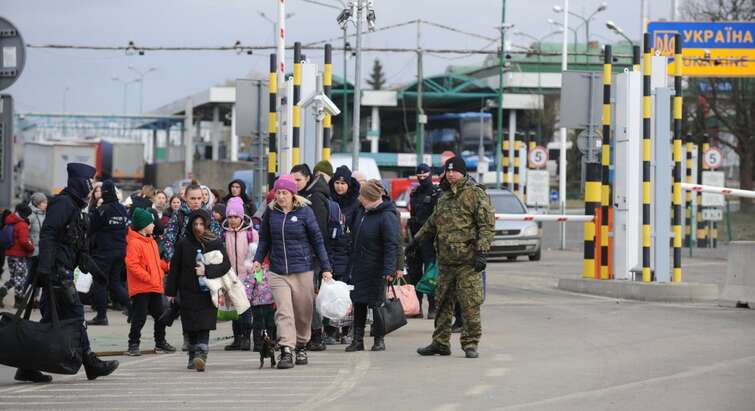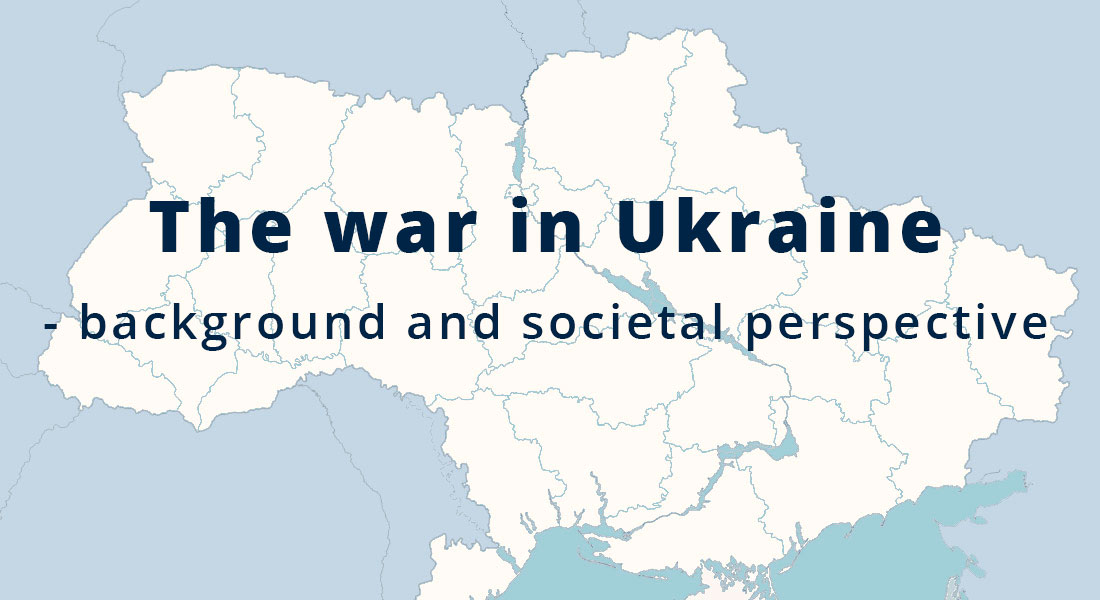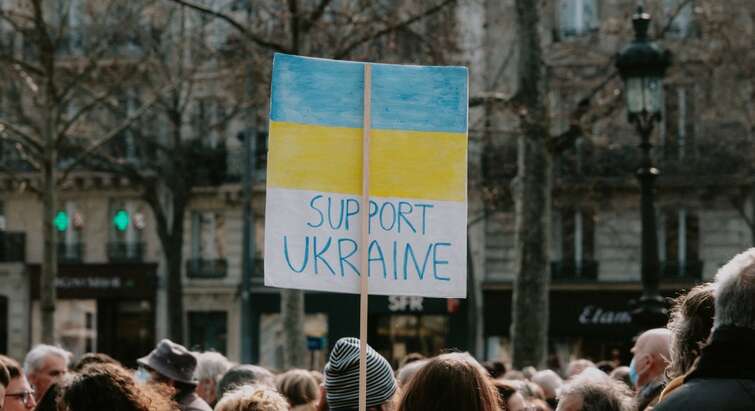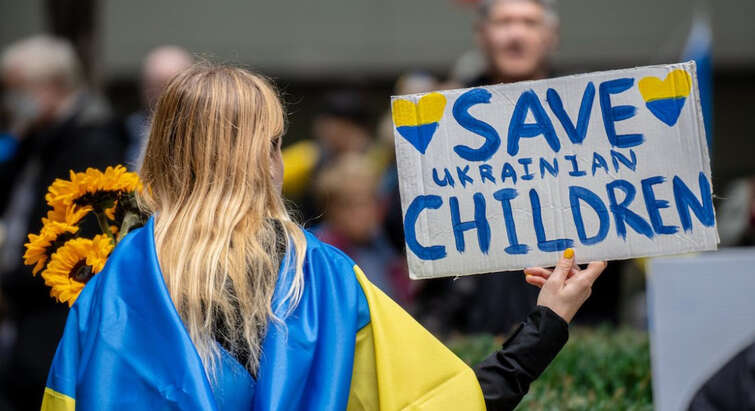

How does the war in Ukraine affect our society?
Researchers from Faculty of Social Sciences illustrate the war in Ukraine based on their research. They will also give comments, analyses and scientific articles that can help you learn more about the many questions the conflict raises.
By Mette Foged, Assistant Professor at the Department of Economics
When the many thousands of Ukrainians who come to Denmark have been given shelter, it's time to learn the Danish language – at least if they end up staying in Denmark. Research indicates that refugees who speak the majority language are better integrated into society. Socioeconomically, early language learning can probably pay for itself in a few years.
Most refugees arrive to the host countries without prior knowledge of the main language of their new country. For the up to 100,000 Ukrainian refugees that the Danish authorities are preparing to receive, language teaching will be a foundation for integration - socially and economically.
Language opens doors
The weather, the culture, the food, the language. It is an unknown world that meets the newly arrived refugee. But one of these elements – language – is of great importance in becoming familiar with the other foreign elements of a society. Refugees who become better at the language in the receiving country are better integrated into the local community.
In Denmark, refugees who acquire a more fluent Danish are less likely to leave the region where they were originally housed, and less likely to move to the largest cities in Denmark, where there are already many with an immigrant background.
Research also shows that once refugees have achieved the language level necessary for them to integrate into the local community, they are also more likely to strengthen other skills by taking an education. Language training also increases refugees' participation in the labor force and leads over time to higher employment and income.
Peter Thisted Dinesen, Professor, Department of Political Science
Following Russia's invasion, more than 3.5 million people have so far fled Ukraine. Primarily to the neighboring countries, but Denmark and other Western European countries are also expected to receive a larger number of refugees. This raises the question of how natives in the recipient countries react to the influx of Ukrainian refugees.
Up to this point, there appears to be strong support for receiving Ukrainian refugees in Denmark.
A prominent study that examined support for different types of refugees in Denmark and other Western European countries in the wake of the refugee crisis in 2015 can help shed light on the likely reception of refugees in Denmark. The study highlights three factors that are central to understanding the willingness to receive refugees:
- The perception of refugees as deserving in relation to threats in their home country. There is little doubt that refugees from Ukraine are currently perceived as “worthy” refugees in Denmark.
- Their religion. The study shows that Christian refugees, like those from Ukraine, are preferred, while refugees with a Muslim background can expect significantly less openness.
- The integration of refugees into the labor market. Here it is worth noting that existing Ukrainians in Denmark have a high employment rate.
Taken together, these factors suggest that Ukrainian refugees will be received positively in Denmark. This is also in line with the broad support in Danish parliament for a special law giving Ukrainians the right to temporary residence in Denmark.
The question is how the support develops in the longer term. If it proves difficult to integrate the refugees into the labor market, or if they settle concentrated in certain areas, the sentiment of native Danes may turn colder.
By professor Kevin Jon Heller, Center for Military Studies
If prosecutions do ever become possible, they should take place in Ukraine itself, the victim of Russian aggression, with the international community’s help.
More than 140 states have described Russia’s unprovoked invasion of Ukraine as an act of aggression. A strong case can also be made that Russian leaders who were involved in planning and executing the invasion have committed a criminal act, as the crime of aggression has existed in international law since the conviction of Nazi leaders at Nuremberg.
Deeming Russian leaders guilty of the crime of aggression, however, is one thing. Actually prosecuting them is another. Although the International Criminal Court (ICC) has opened a formal investigation into war crimes and crimes against humanity committed in Ukraine, the Court cannot prosecute Russian leaders for aggression because the crime does not apply to nationals of states that, like Russia, have not joined the Court.
Given the impossibility of an ICC prosecution, 40 political and legal luminaries, including the former Prime Minister of the UK, Gordon Brown, have called on states to create a Nuremberg-style Special Tribunal for the Punishment of the Crime of Aggression Against Ukraine. Such a tribunal, they believe, is necessary to complement the ICC’s investigation.
I disagree. As I explain in a long post at my blog Opinio Juris, a Special Tribunal is a bad idea for a variety of reasons: it would be unlikely to ever obtain the suspects and evidence it needs for successful prosecutions; its creation is not necessary to affirm the criminality of aggression; and it would be legally unable to ignore the personal immunity of Russian leaders like Putin and his Foreign Minister, Sergey Lavrov. In my view, if prosecutions do ever become possible, they should take place in Ukraine itself, the victim of Russian aggression, with the international community’s help.
By senior researcher Maria Mälksoo, Centre for Military Studies
Is the Russian war in Ukraine the failure of Western deterrence?
In psychological terms, deterrence is a game of make-believe that is meant to work as a self-fulfilling prophecy: the credibility of a threat or allied commitment determines deterrence’s politically defined success. While the Western deterrence of Russia’s military assault did not work in the immediate sense, it has nonetheless been doing political work by providing some symbolic reassurance to Ukraine and NATO’s eastern flank allies. Although the collective dissuasion of Russia not to invade Ukraine fell through, the Western community has become politically more unified in the course of ritual action. The Russian invasion was promptly met with Western sanctions and quite an unprecedented show of political unity on part of the standardly prevaricating EU. NATO’s amplification of its forward presence as a costly signal in the alliance’s eastern states followed suit. In response to Russia’s invasion of Ukraine in February 2022, Allies are sending additional ships, planes and troops to NATO’s eastern and south-eastern flank in Europe, making extended deterrence further seen to exist within NATO. The debate over making NATO’s troop presence in the Baltic region permanent has become newly actual again. It is yet too early to tell who will have prevailed in the long game of deterrence.
By PhD fellow Jakob Dreyer, Department of Political Science
Although the military outcome of Russia's aggressive invasion of Ukraine remains unresolved, the war has already catalyzed the development of the EU´s security policy. From the Coal and Steel Union to the development of the internal market, the EU is built on the idea that mutual economic dependence is at the heart of the European peace project.
It is historic that more countries will increase their defense budgets to over 2 percent of GDP and that the EU will finance weapons in a conflict but the actions are made possible by decades of defense and security policy developments. The biggest landslide seen from Brussels is that the EU´s economic-rational logic is being challenged by a security modus operandi across policy areas.
True to the economic rationale, the EU imports 60 percent of its energy. And over 40 percent of gas, 25 percent of oil, and almost half of the coal is imported from Russia. Germany is leading the way in exempting energy from EU sanctions. The hesitancy over an energy boycott illustrates the dilemma between economic thinking and the security logic of exception.
The question now is whether the bureaucratic machine will return or whether the security logic will dominate. The political agreements now forged in the shadow of Ukraine's struggle for survival will shape Europe for generations.
Read more in the article here at Altinget, written together with Christine Nissen from the Danish Institute for International Studies.
Images of war and its consequences create strong emotions. And strong emotions create demands for political action.
By Professor Lene Hansen, Department of Political Science
The war in Ukraine is brought to us through heart-breaking images. Civilians lying dead in the streets, suitcases signifying an attempted escape. Panoramic videos demonstrating the destruction of what was once monumental apartment buildings. Russian tanks being blown to pieces. Women and children fleeing the country, beloved pets, too.
Should we trust (all) the images we see? That question sits at the heart of how we know the war. Not just because images provide information on how the war is unfolding but because images evoke emotions in ways that words rarely do. Images make us feel the impact of war as it affects living, hurting human beings, like ourselves. If images are real or fake matters.
Western policy-making toward the war takes place within this visual-emotional landscape. Images pressure politicians to care and to act. As the war carries on, how will Western politicians respond to a continuous flow of images of death and destruction?
Read more about the politics of emotions and images of flight and refugees:
- Review of International Studies: Images, emotions, and international politics: the death of Alan Kurdi
By Anders Wivel, Professor at the Department of Political Science
As a consequence of the war in Ukraine, the development of Danish defense policy is accelerating. We will arm ourselves - but we will never be able to manage without the United States as a committed ally in Europe.
Russia's invasion of Ukraine will lead to Denmark spending more money on the armed forces in the future. However, we should think carefully and look for opportunities for collaboration with e.g. Norway and Germany when making investments.
Initially, the most important tasks are to build up ammunition depots and secure basic equipment, just as surveillance capacity should be increased. In the longer term, we should contribute to NATO being able to negotiate with Russia from a position of strength.
We're going to arm, but we have to do it wisely. Against Russia, Danish armaments in themselves will not help much, because we cannot defend ourselves alone. Our investments in the armed forces should rather aim at keeping the United States as a committed ally in Europe - for the United States is looking more towards the Pacific than towards Europe in these years.
Our NATO contribution is an insurance, and the war in Ukraine has raised the insurance premium that we have to pay now.
See Anders Wivel's analysis of the long term Danish defense and security policy in:
Anders Wivel (2020). In War and Peace: Security and Defense Policy in a Small State. In P. M. Christiansen, J. Elklit, & P. Nedergaard (Eds.) The Oxford Handbook of Danish Politics (pp. 453-469). Oxford University Press.
Christian Bueger, Professor of International Relations, University of Copenhagen
Tobias Liebetrau, Postdoc, Sciences Po Paris
Every time a European internet user logs into a Gmail account or "likes" a Facebook post, the data request moves via a global network of undersea cables. Should these cables be damaged, it could be very costly for Western economies and paralyze a significant part of the communication in Europe and North America.
For years, there has been a suspicion that Russia is considering such sabotage. In recent years, Russian personnel has been spotted doing naval research in coastal areas of Ireland and Norway, where several cables are linking Europe to the United States.
All it takes to deliberately damage a cable is a merchant ship or fishing boat dropping anchor on a cable not far from the coast, where the cables are at a reasonably shallow level. Alternatively, divers or submarines could place explosives, which could then be detonated remotely.
Taking out one cable will have very limited effect on global internet communication. It is possible, however, that Russia could launch some lesser attack, just to prove its power and capability. They could go after one or two cables as a symbolic gesture.
A Russian attack damaging several cables would most likely be considered an act of war by the West. Such an attack would mainly affect the civilian population. While there is no alternative to undersea cables for everyday internet use, parts of military or government-to-government communications could still be handled by satellite networks.
Read more about the scenario in this article published by France 24: https://www.france24.com/en/europe/20220323-threat-looms-of-russian-attack-on-undersea-cables-to-shut-down-west-s-internet
By Kristoffer Albris, Assistant Professor at Copenhagen Center for Social Data Science and Department of Anthropology
In crises, control of the population's data is a top priority for states. Both information flows and the underlying infrastructure. It is therefore interesting to follow the tech giants ' response to Russia's invasion of Ukraine and Russia's reaction to their actions.
In wars, in disasters, and as we know, in pandemics, there is a great deal of uncertainty, events unfold at the speed of lightning, and the spread of disinformation causes the truth to stagger. Therefore, control of the population's data in crises is a top priority for states, a "raison d'etats", as I and a colleague from Vrije University Amsterdam have pointed out in a research article in the journal Politics & Governance.
But states also have a deeper interest in controlling not just data and information, but also the electronic (hardware) and digital (software) infrastructures that form the basis for the creation of data. For this reason, it is also interesting to see what is currently happening, politically, with the major tech giants' response to Russia's invasion of Ukraine, as well as Russia's response to their actions. And these are no small things: Youtube has announced a global blockade of Russian state channels and videos, Facebook has blocked the advertising activities of Russian government media and Twitter has reduced visibility of the media controlled or indirectly controlled by the Russian state.
In response to the tech giants' retreat from Russia or altered regulations, Putin and his state apparatus have instead rolled out so-called copies of the platforms, which are hardly distinguishable from the originals. For example, Rossgram, a copy of Instagram that the Russian government closed after Meta (who is also behind Facebook) announced changes to their regulations for posts in Ukraine. As commentators point out, the purpose of making a copy of the well-known platforms is not just to give Russian citizens an alternative, while "the real deal" is closed down. In all probability, the new copy platforms also form part of an upscaling of the monitoring of citizens' actions by the Russian state in order to strike down on critical voices and protests. By launching a platform that has the same interactive capabilities as the original Instagram, the Russian state can control the actual programming of the digital infrastructure, thereby making the platforms comprehensive surveillance units monitoring the country's citizens.
Excluding Russians from the Internet's various platforms therefore has a potential negative bias, if the West has an interest in the ordinary Russian citizens having access to free information, both during the war and in the future that is on the other side of the war.
In other words, tech giants and social media platforms have become part of the geopolitical battleground. Not only in relation to the spreading of disinformation and cyber-attacks, but also when it comes to who decides where the platforms will operate, who and what they should block, and what they can and should be used for as part of a political strategy.

PHYSICAL HUB ON THE WAR IN UKRAINE
A number of staff and students at Faculty of Social Sciences have been affected by the situation in Ukraine in different ways.
Therefore, the faculty created a physical hub for everyone who needed a place to discuss the situation with colleagues and fellow students.
Room 4.1.02 were open every Friday during the first period of the war in Ukraine. It formed the framework for a series of events on the situation as it developed. These events were announced on KUnet.

At the Faculty of Social Sciences, a number of Russian staff and students have their daily routine. We must make it very clear that we do not hold them accountable for President Putin's actions. We stand for the opposite: openness, curiosity and professionalism.
The university has always been - and must continue to be - a free space for the exchange of values and knowledge. Here we acknowledge the good argument and the thorough analysis. We do not judge people - our staff, our students or our guests - by who they are and where their passports are issued; we judge them on how good their arguments are.
These values are also the foundation of our collaboration with our colleagues in the global exchange of knowledge. None of those values are consistent with autocracy and aggression. Danish universities have therefore stopped cooperating with Russia and Belarus. I hope we can quickly enter into dialogue with Russian academics who do not support Putin's war of conquest.
I am deeply touched by the suffering inflicted on the Ukrainian people as a result of the Russian invasion. The result of Russia's aggression is a greater insecurity in Europe, but perhaps also a greater awareness of the value of peace and freedom.


